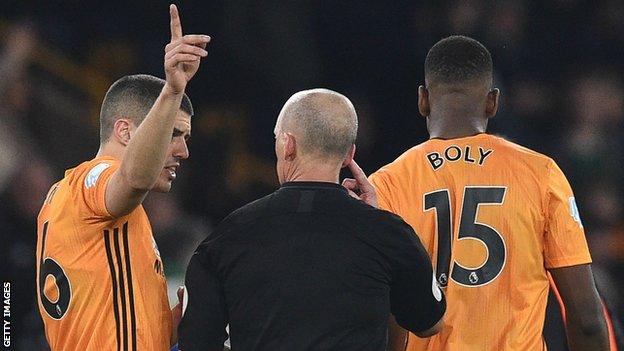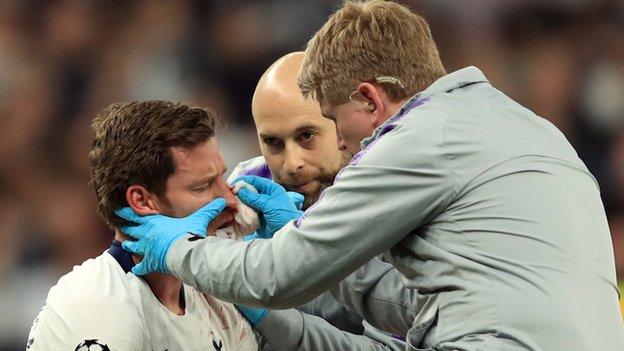Offside and handball laws under Ifab review along with concussion substitutions
Last updated on .From the section Football

Football's rule-makers are to review the offside law in order to "foster the spirit of attacking play".
The decision was made at the annual general meeting of The International Football Association Board (Ifab).
The organisation, meeting in Belfast, also approved clarifications to the handball law to "differentiate more clearly" between the arm and shoulder.
And substitutions for concussion cases are to be trialled, potentially at the Tokyo Olympics this summer.
It appears likely that permanent substitutions would be the preferred option rather than a temporary substitution while a 10-minute assessment is carried out.
- Wenger suggests offside law could 'change a little bit'
- 'VAR should not be too forensic'
- VAR: 'Armpit offsides' strike again in the Premier League
Offside decisions have come under closer scrutiny in the Premier League this season following the introduction of the video assistant referee.
The time spent reaching a decision over marginal calls earlier in the season prompted Ifab general secretary Lukas Brud to reiterate that VAR systems should only be used to correct "clear and obvious errors".
Earlier this month, Fifa's chief of global football development Arsene Wenger said there might be room to the change the offside law "a little bit" in response to video assistant referee controversy.
The former Arsenal manager wants to refine the rules to favour the attacking player, saying they should be deemed onside if any part of their body that can score a goal is at least level with the defender, even if other parts are in front.
Wenger's calls for the introduction of what has been dubbed a 'daylight' offside rule have since been backed by Fifa president Gianni Infantino.
He said that principle was backed by the rest of the Ifab.
"It has been received very positively," said Infantino after Saturday's meeting. "That is why we decided to study this further, to debate it in different panels and with different stakeholders to elaborate a protocol.
"Obviously the philosophy of fostering attacking football always has to guide us. We have to be aware of tradition but it is true the offside rule has evolved over time.
"We will look into providing strikers more goalscoring opportunities and that's why I think the feeling in the room and the feedback in the room was positive. But we have to test it."
Concussion substitutes set to be trialled at Olympics

The Ifab's decision to trial the use of concussion substitutes has been welcomed by Football Association chief executive Mark Bullingham.
He said the FA and Premier League both favoured the permanent substitution model and are keen to be part of any future trials.
The first step looks likely to be made at this summer's Olympics, in both the men's and women's competitions.
Irish Football Association chief executive Patrick Nelson, who chaired the meeting, said: "We agreed it would be a sensible move to draw up some protocols for trials.
"More research data is needed before we could consider any permanent changes to the laws."
The current guidelines allow a three-minute assessment period for concussion and Infantino is keen to assess alternatives in any future trials after criticism over Fifa's handling of the issue.
"If there is any doubt you have to keep the player out, and for the coach to have another possibility, he knows there is an additional substitution," he said.
"Often we were criticised for being slow (on concussion). Now, we move, we try, and then we'll see."
Brain injury charity Headway led calls for temporary concussion substitutions to be introduced following the head injury suffered by Tottenham defender Jan Vertonghen during last season's Champions League semi-final against Ajax.
He was treated for five minutes on the pitch and tried to play on but was led off after appearing unwell.
Peter McCabe, the chief executive of Headway, said today's ruling was "just another example of football failing to act".
"This latest announcement just doesn't go far enough to protect players from the dangers of returning to play following a concussion," he said.
"In practical terms nothing will actually change for the injured player."
Handball rule adopts the 'T-shirt line'
The most significant change to the laws of the game to come out of today's Ifab annual general meeting concerned the handball rule.
From the start of the 2020/21 season, the point at which the arm stops and the shoulder begins will now be written into the laws of the game as the "T-shirt line".
The new ruling aims to allow match officials to "differentiate more clearly" between the arm and shoulder.
Confusion about where the line is drawn was evident in Burnley's 3-0 win at home to Bournemouth last weekend.
The Cherries had a Joshua King goal ruled out by a VAR check for a handball by Philip Billing that manager Eddie Howe claimed came off his shoulder.
And the match swung in the second-half on another handball decision, again made by VAR, against Bournemouth's Adam Smith, who was judged to have used his upper arm to control the ball.
The "T-shirt line" is the latest in a number of clarifications to the handball rules, which, like the offside laws, have been put under the microscope by the use of VAR.
The last amendment, which has been in force since last season's Champions League final, said handball would be given against a player if their arms extend "beyond a natural silhouette" - even if it is accidental.
Analysis
BBC sports news reporter Laura Scott
The introduction of concussion substitutes, as a trial at first, is a big step forward and follows years of campaigning.
Fifa president Gianni Infantino noted that they have been accused of acting slowly on this, but this decision will be welcomed by many, including brain injury charities.
How exactly they will work in practice will be the subject of discussions over the next few months, as the protocol is drawn up.
On VAR, Infantino said that people "need to relax", adding that "there is only one league in the world today where this issue seems to be a big problem".
Perhaps reflecting this, there weren't any concrete changes, but they'll continue reviewing it, particularly around communication of decisions.
























Comments
Join the conversation
Just shows how bad English officials are and why none of them went to the World Cup! Tweaking the laws to make up for their incompetence is just embarrassing.
Webb's failure to send De Jong off for his assault on Xabi Alonso in the 2010 WC final has made English officials the laughing stock of the world ever since.
Condoning cheating is as bad as actually doing it!
The amount of time fans get to see the ball actually in play is getting less and less and this would save on all sorts of time wasting by players, managers and VAR.
The good news is I've got my life back now as I've stopped watching live Premiership games on TV.
It should have been obvious from the start that this was a crazy move.
Diving; STAMP IT OUT!!!!!
so attacker running towards goal trailing foot is level with the trailing foot of a defender heading towards the half way line - thats a full metre and some between the bodies but onside - really?
Keep the rule the same widen the lines and require daylight between the lines = clear and obvious